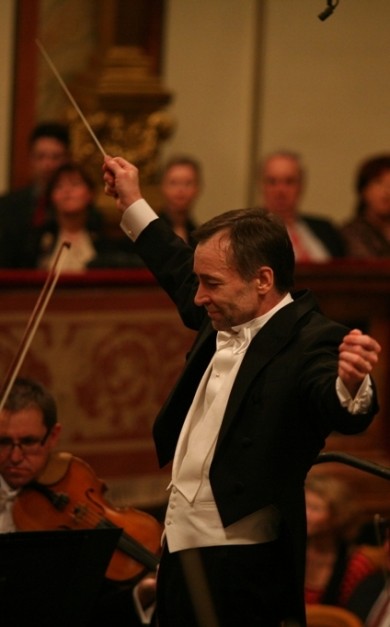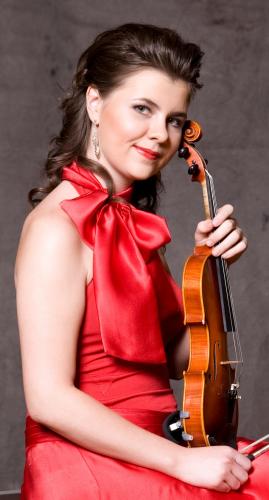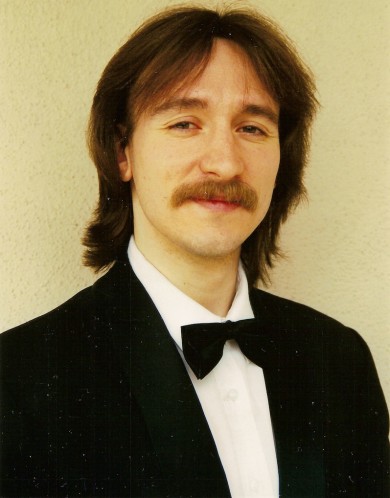Soloists, Polish orchestra bring passion to national music at Kravis

Boguslaw Dawidow led the Opole Philharmonic Orchestra Tuesday night at the Kravis Center in West Palm Beach.
The Opole Philharmonic, if not exactly a household name among concertgoers, was founded in 1947, and became the resident orchestra of Opole, an historical city in Southern Poland. Appearing at the Kravis Center Tuesday as part of their first American tour, the entourage under conductor Boguslaw Dawidow, and two soloists, showed their special brand of performance practice from Central Europe.
To begin with, the orchestra is exceptionally disciplined. Like several other European ensembles, they quietly enter together and are fully seated within a minute. Only when the concertmaster, who makes no separate entry, asks for an “A” from the oboe do we hear some relatively quiet tuning up. The entire ensemble is quickly ready for action as the conductor rapidly ascends the podium.
Strauss’s Don Juan began tentatively, with a reticence hardly becoming to the self-confidence and swagger usually associated with this anti-hero. With cautious tempo, and strings lacking the refulgence needed to bring the work alive, it’s hard to think this Don capable of seducing even a single gentle maiden. A loving oboe solo eventually gives way to the most splendid of fanfares from unison French horns. Alas–no bravado, no stentorian tones to grab the attention, and no fortissimo demonstration of the Don’s confidence.

Marta Kowakcyk
Things improved greatly for Henryk Wieniawski’s lovely Violin Concerto No. 2 in D minor. This romantic work has the free flowing lyricism of the composer’s compatriot and contemporary, Frederic Chopin. Violinist Marta Kowalczyk, age 20, need defer to no one in her technical prowess, emotional control, and ability to project her rich tone throughout the hall. Her intonation also held true during the most challenging passages of the piece. Once a Heifetz favorite, the concerto has fallen from grace these days, and is infrequently programmed. The beautiful slow movement Romance and Gypsy-like closing Allegro moderato reminded us of what we have been missing. Dawidow and the orchestra provided admirable accompaniment and the many woodwind solos were played in true partnership with the soloist.

Evgeni Mikhailov
Rarely in a concert do we get two soloists in two concertos. As a tribute to Polish creativity, the infrequently heard and performed Piano Concerto in A minor by Ignacy Jan Paderewski brought Russian pianist Evgeni Mikhailov to the stage. Better known as a pianist and politician, Paderewski cast his concerto in the same mold as Chopin and Liszt, but with a heavy dosage of Grieg and Tchaikovsky. The notes fly from the piano with dizzying rapidity, and the thematic material is bold, melodic, and strongly nationalistic. Mikhailov found much to savor in the quiet lyrical moments, but never held back in showing us the bravura that is at the heart of the Concerto. Once again the Opole Philharmonic seemed to live and breathe the music with their soloist. With the audience rising to their feet, Mikhailov played Grieg’s In the Hall of the Mountain King as an encore. The arrangement was a real knuckle-breaker, but the pianist, managed to find all the energy and style to make it an experience to remember
Franz Liszt, creator of the “symphonic poem” produced 12 of them, although few are ever played these days. Mazeppa, the sixth, relates the story of a 17th-Century Polish nobleman who had an affair with the wife of a count. As punishment he was tied to the back of a horse and sent galloping into the wilderness. Half dead, he was rescued by Cossacks and eventually became their leader. The wild ride is depicted in the music, and the piece concludes with an heroic march.
Bombast reigns supreme here, and the piece can only be fully appreciated if the conductor plays it straight, without looking for profundity or interpretive niceties. The orchestra played at full throttle and poor Mazeppa was eventually redeemed. It made for an exciting close to an interesting program, with the orchestra establishing a positive reaction despite some occasionally imprecise chording, and over-enthusiastic trumpet playing. A nicely played Waltz from Khachaturian’s Masquerade Suite served as an encore.
Posted in Performances
2 Responses to “Soloists, Polish orchestra bring passion to national music at Kravis”
Leave a Comment
Wed Jan 26, 2011
at 3:50 pm
2 Comments






Posted Jan 27, 2011 at 5:17 pm by ENeumeyer
An excellent review. Thank you!
Posted Feb 08, 2011 at 6:50 am by violinist
Beautiful Wieniawski. I congratulate!